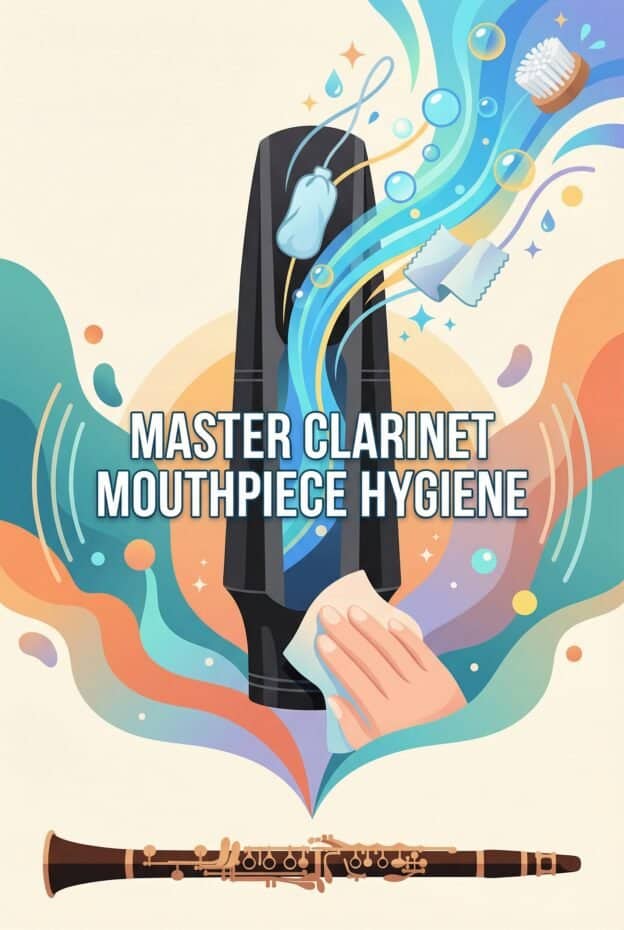How to clean a clarinet mouthpiece in 6 steps: remove the reed and ligature, soak the mouthpiece 10-15 minutes in warm soapy water (never hot), brush the inside with a soft mouthpiece brush or pipe cleaner, rinse well, disinfect with rubbing alcohol if needed, then dry completely on a rack or with a lint-free cloth.
Why Clean Your Clarinet Mouthpiece: Health and Sound
Clarinet mouthpiece cleaning is the routine removal of saliva, food particles, and mineral deposits that collect inside and outside the mouthpiece. Regular cleaning protects your health, prevents odors, and keeps your sound clear and responsive. A clean mouthpiece also helps reeds seal properly, which improves articulation, intonation, and overall control.
Every time you play, moisture, sugars, and bacteria from your mouth coat the tip rail, table, and inner bore. Over time this residue hardens, traps odor, and creates a sticky surface that reeds must vibrate against. That buildup can cause sluggish response, squeaks, and a dull, unfocused tone that no new reed can fully fix.
From a health perspective, a neglected mouthpiece can harbor dense bacterial colonies. Players often notice a sour or moldy smell from the beak or chamber after a few weeks of no cleaning. Consistent hygiene reduces the risk of mouth irritation, chapped lips, and the unpleasant experience of sharing germs in school or community ensembles.
Acoustically, the mouthpiece is the clarinet's control center. The tip rail, facing curve, and chamber shape all influence how the reed vibrates and how air flows into the bore. Even a thin film of residue along the tip or in the chamber can change response, making soft attacks harder and pitch less stable across the range.
Clean mouthpieces help reeds seat evenly on the table and seal well at the tip. This leads to quicker response, more reliable staccato, and fewer random squeaks. Many players report that a thorough weekly cleaning makes the clarinet feel 10 to 20 percent more responsive, especially in soft dynamics and altissimo entries.
Hygiene impact: Regular cleaning can cut bacterial load on a mouthpiece surface by over 90 percent when you combine warm soapy water with proper drying. Even a 30-second rinse and wipe after each practice sharply reduces odor and visible residue.
Important Tools and Materials (mouthpiece brush, pipe cleaners, suction bulb, etc.)
Effective clarinet mouthpiece cleaning depends on using soft, non-abrasive tools that match the mouthpiece's internal shape. The goal is to reach the tip rail, chamber, and bore without scratching the facing or table. A small, dedicated cleaning kit makes it easy to maintain a consistent routine at home, in school, or on tour.
The core tool is a clarinet mouthpiece brush. This is a short, soft-bristled brush sized to fit the mouthpiece bore and chamber. Choose nylon or similarly gentle bristles and avoid metal cores that protrude at the tip. The brush should glide through the bore without scraping the inner walls or the tip opening.
Pipe cleaners are helpful for tight spots the brush cannot reach. Use soft, non-abrasive pipe cleaners without embedded metal grit. They are ideal for cleaning the throat area just below the tip and around the tenon where moisture and residue often collect. Always twist gently and avoid forcing them into the tip opening.
A small suction bulb, like a baby nasal aspirator, is a powerful tool for removing water from the bore after rinsing. By squeezing and releasing at the shank end, you pull out droplets that would otherwise sit inside and encourage mineral deposits or mildew. This is especially useful for hard rubber and wood mouthpieces.
You will also need a soft toothbrush or dedicated mouthpiece detail brush, a mild dish soap, and a lint-free cloth. The toothbrush helps clean the beak, table, and exterior corners where fingers and lips contact the surface. The cloth is for careful drying of the outside and tenon cork without leaving fibers behind.
Optional but useful items include cotton swabs for precise work near the tip rail, a small plastic tub for soaking, and isopropyl rubbing alcohol for disinfection. For mineral deposits, keep white vinegar on hand, but only use it briefly and with caution, especially on hard rubber or wood. Always finish with a thorough water rinse.
Time investment: A full weekly cleaning with soak, brush, rinse, disinfection, and drying usually takes 15-20 minutes, including 10-15 minutes of soak time and about 5 minutes of hands-on work.
Step-by-Step Cleaning Process (remove, soak 10-15 minutes, brush, rinse, disinfect, dry)
A consistent step-by-step process keeps your clarinet mouthpiece clean without risk of damage. The sequence below works for most plastic and hard rubber mouthpieces and can be adapted for wood with shorter soaks and extra drying care. Use warm water only, never hot, to avoid warping or discoloration.
1. Remove reed, ligature, and mouthpiece from the clarinet
Carefully remove the reed and ligature, then slide the mouthpiece off the barrel. Wipe any visible moisture from the tenon cork with a lint-free cloth. Place the reed in a reed case and keep the ligature dry. Never soak the reed or ligature with the mouthpiece, since both can be damaged by soap or long immersion.
2. Prepare warm soapy water and soak 10-15 minutes
Fill a small tub or cup with warm tap water and add a drop or two of mild dish soap. The water should feel comfortably warm to your fingers, not hot. Submerge the mouthpiece fully, making sure the chamber and bore fill with water. Let it soak for 10-15 minutes to soften dried saliva and mineral deposits.
3. Brush the interior with a soft mouthpiece brush or pipe cleaner
After soaking, insert the mouthpiece brush from the shank end and gently scrub the bore and chamber. Rotate the brush to loosen residue. For tight areas near the throat, use a soft pipe cleaner, but keep it away from the delicate tip opening. Do not twist or force tools against the tip rail or facing curve.
4. Clean the tip, table, and exterior surfaces
Use a soft toothbrush or detail brush on the exterior, beak, and table. Brush along the length of the table, not across it, to avoid catching the tip. For the tip rail and facing, use only very light strokes or a soft cloth. Avoid pressing on the tip or flexing it, since this can change how reeds seal and vibrate.
5. Rinse thoroughly and optionally disinfect
Rinse the mouthpiece under a gentle stream of cool or lukewarm water, making sure all soap is removed from the bore, chamber, and tip. For disinfection, lightly dampen a cloth or cotton pad with isopropyl rubbing alcohol and wipe the beak, table, and exterior. Avoid soaking the mouthpiece in alcohol, especially hard rubber or wood.
6. Extract excess water and dry completely
Use a suction bulb at the shank end to pull out water droplets from the bore. Then place the mouthpiece on a drying rack or clean towel with the tip facing down or sideways so water can drain. Pat the exterior dry with a lint-free cloth. Allow the mouthpiece to air dry completely before putting it back on the clarinet or into a case.
Drying target: Give the mouthpiece at least 30-60 minutes of air drying after a full soak and rinse. Even if the exterior feels dry, internal moisture can remain in the bore and around the tenon cork.
Cleaning Frequency: After Every Use, Weekly, Monthly, and Deep Cleans
Cleaning frequency depends on how often you play, your environment, and your personal hygiene. A simple rule is to do a quick wipe and rinse after every session, a full brush-and-soak once a week, and a deeper inspection and mineral removal every month or two. Consistency matters more than perfection.
After every use: 30-60 seconds
At the end of each practice or rehearsal, remove the reed and ligature, rinse the mouthpiece briefly under lukewarm water, and shake or wipe off excess moisture. This prevents fresh saliva from drying into hard residue. Dry the tenon cork with a cloth and let the mouthpiece air out before storing it in the case.
Weekly: full 6-step cleaning
Once a week, especially for students and active performers, follow the full 6-step cleaning process with a 10-15 minute soak and interior brushing. Weekly cleaning keeps the bore and chamber free of buildup and maintains a consistent response. Many players notice that reeds feel more predictable after a regular weekly clean.
Monthly: inspection and mineral deposit control
Once a month, inspect the tip rail, table, and interior for white or chalky deposits, discoloration, or odor. If you see mineral buildup, use a brief white vinegar soak of 2-3 minutes on plastic mouthpieces, followed by a thorough rinse. For hard rubber or wood, use a damp cloth with diluted vinegar instead of immersion.
Deep cleans after illness or heavy use
After a respiratory illness or an intensive playing period such as a festival or tour, combine the weekly clean with extra disinfection. Use isopropyl alcohol on the beak and exterior, and consider a manufacturer-safe disinfectant spray. Allow extra drying time and avoid sharing mouthpieces until you are fully recovered.
Adjusting for young students and shared instruments
For school band programs, where instruments may be shared or stored in crowded cases, increase cleaning frequency. A quick rinse after every rehearsal and a full clean at least once a week should be standard. Band directors can schedule monthly checks to ensure mouthpieces are not developing visible buildup or strong odors.
Material-Specific Care: Plastic, Hard Rubber/Ebonite, and Wood Mouthpieces
Clarinet mouthpieces are commonly made from plastic, hard rubber (ebonite), or wood. Each material reacts differently to heat, chemicals, and moisture. Tailoring your cleaning routine to the material prevents warping, discoloration, or cracking while still keeping the mouthpiece hygienic and responsive.
Plastic mouthpieces
Plastic mouthpieces, often used by beginners and in school programs, are generally the most forgiving. They tolerate regular 10-15 minute soaks in warm soapy water. Avoid very hot water, which can warp the facing. Plastic is usually safe with brief white vinegar soaks for mineral deposits, followed by thorough rinsing and complete drying.
Plastic surfaces are less prone to chemical discoloration than hard rubber, but they can scratch easily. Use only soft brushes and avoid abrasive cleaners. Over time, heavy scratches inside the bore or on the table can affect response, so gentle technique still matters even with this durable material.
Hard rubber (ebonite) mouthpieces
Hard rubber mouthpieces are common among advancing and professional players. They offer rich tone but require more care. Prolonged exposure to strong cleaners or alcohol can cause oxidation or discoloration, turning the surface greenish or brown. Keep soaks to 10-15 minutes in mild soapy water and avoid hot water altogether.
For mineral deposits on hard rubber, skip long vinegar soaks. Instead, use a cloth lightly dampened with diluted vinegar to wipe affected areas, then rinse immediately. When disinfecting, apply isopropyl alcohol with a cloth only to the beak and exterior, and do not immerse the mouthpiece in alcohol.
Wood mouthpieces
Wood mouthpieces are less common but prized by some players for their feel and sound. Wood is very sensitive to water and temperature changes. Do not soak a wood mouthpiece. Instead, wipe the interior gently with a barely damp swab or cloth and immediately dry with a suction bulb and air circulation.
For wood, rely on frequent light cleanings rather than occasional deep soaks. Use a soft brush dry or slightly damp for the bore, and keep the exterior dry except for gentle wiping. Avoid alcohol and vinegar on wood, as both can dry the material and increase the risk of cracking or warping.
Field Note from the Martin Freres archives: Historical Martin Freres clarinets were often paired with hard rubber and occasionally wood mouthpieces crafted to match specific bore designs. Surviving examples show that careful, gentle cleaning preserved facing curves and chamber shapes for decades, while harsh chemicals and heat visibly damaged some early 20th century pieces. A separate archive study could map how cleaning habits influenced mouthpiece longevity over time.
Drying, Storage, and Preventing Odors
Drying and storage are just as important as brushing and soaking. Lingering moisture in the bore or around the tenon cork encourages bacterial growth and mildew, which cause strong odors and can affect cork integrity. Proper airflow and short-term open storage after playing help keep the mouthpiece fresh between sessions.
After rinsing, always remove as much internal water as possible. A suction bulb at the shank end is very effective. Squeeze the bulb, place it over the bore, then release to pull out droplets. Repeat until you no longer see water coming out. This reduces mineral rings and cloudy deposits that form as water dries inside.
Place the mouthpiece on a clean towel or drying rack with the tip facing down or sideways. Avoid resting it on the tip itself. Let it air dry for at least 30-60 minutes before closing it in a case. Trapped moisture in a closed case is a major cause of persistent odor and can lead to mold growth in extreme cases.
For storage, keep the mouthpiece in a ventilated compartment or case with some air circulation. If your case has a very tight seal, consider leaving it slightly open at home for a short time after practice so moisture can escape. Never store a wet mouthpiece in a sealed plastic bag, as this creates an ideal environment for bacteria.
To prevent odors, maintain the quick daily rinse and weekly clean schedule. If you notice a sour smell, increase cleaning frequency and allow more drying time. Some players place a small, unscented silica gel packet in the case to help control moisture, but keep it away from direct contact with the mouthpiece surface.
Finger oils and food residue also contribute to odor. Wash your hands before playing and avoid sugary drinks or snacks immediately before practice. A simple mouth rinse with water before you play can significantly reduce the amount of residue that reaches the mouthpiece, which keeps both the instrument and your breath fresher.
Troubleshooting Common Problems (stains, odors, warping, clogs)
Even with good habits, clarinet mouthpieces can develop stains, odors, or performance issues. Troubleshooting starts with matching the symptom to a likely cause, then choosing a safe solution. Avoid aggressive scrubbing or harsh chemicals, since these can permanently damage the facing, chamber, or material surface.
Persistent odor → Likely cause: bacterial buildup and trapped moisture. Solution: perform a full 6-step clean, then add a monthly sanitization routine with manufacturer-safe disinfectant or a wipe-down with isopropyl alcohol on the beak and exterior. Increase drying time and avoid storing the mouthpiece wet in a closed case.
White or chalky deposits → Likely cause: mineral deposits from hard water. Solution: for plastic, use a brief 2-3 minute soak in a 1:1 mix of white vinegar and water, then rinse thoroughly. For hard rubber, use a cloth dampened with diluted vinegar and rinse right away. For wood, avoid vinegar and rely on distilled water rinses and more frequent drying.
Cloudy or discolored surface → Likely cause: chemical reaction or oxidation, especially on hard rubber. Solution: stop using strong cleaners or long alcohol soaks. Clean gently with mild soap and water only. If discoloration is severe but the mouthpiece plays well, it may be cosmetic. For valuable pieces, consult a specialist before attempting polishing.
Warping or uneven response → Likely cause: exposure to hot water or heat sources. Solution: if the reed no longer seals evenly on the table or the tip appears distorted, do not attempt to bend it back. Have a qualified repair technician or mouthpiece refacer evaluate it. Future cleanings should use only lukewarm water and shorter soaks.
Clogs or gurgling sound → Likely cause: debris or thick residue in the chamber or throat. Solution: perform a full soak and brush, paying special attention to the bore near the tip and throat. Use a soft pipe cleaner to gently clear any remaining blockage. Avoid pushing debris further in; always work from both ends if needed.
Scratches inside the bore or on the table → Likely cause: abrasive brushes or tools. Solution: switch to softer brushes immediately. Minor scratches may not be audible, but deep or uneven damage can affect response. If you suspect performance changes, have a professional evaluate the mouthpiece for possible refacing or replacement.
When to Repair or Replace Your Mouthpiece
Even with excellent care, clarinet mouthpieces do not last forever. Material wear, accidental damage, and subtle facing changes can gradually reduce performance. Knowing when to repair or replace a mouthpiece helps you maintain consistent tone and response without clinging to a piece that is holding you back.
Consider repair or replacement if you see visible chips or cracks at the tip or rails. Even small chips can affect how the reed vibrates and may cause chronic squeaks or uneven response. A skilled mouthpiece refacer can sometimes reshape the tip and rails, but severe damage often means replacement is more practical.
If reeds that used to work well suddenly feel unstable, stuffy, or unpredictable despite regular cleaning, the facing curve or table may have warped. This can happen from heat exposure or long-term pressure. A technician can measure the facing and table flatness and either reface the mouthpiece or recommend a new one.
Persistent discoloration or oxidation on hard rubber is mostly cosmetic, but if it is accompanied by a strong sulfur smell or surface roughness, the material may be degrading. In such cases, even careful cleaning may not restore the original feel. Upgrading to a new mouthpiece can improve both hygiene and playing comfort.
For students, a mouthpiece that no longer supports their advancing technique is another reason to replace. As embouchure, air support, and musical demands grow, a higher quality or different facing can offer better control. Regular cleaning protects your investment, but it cannot change an inherently mismatched design.
As a general guideline, many active players keep a primary mouthpiece for several years with proper care, then re-evaluate with a teacher or technician. If you notice that a clean mouthpiece still feels inconsistent or dull compared to a similar new model, it may be time to retire it to a backup role or archival collection.
Quick Daily Routine for Players (30-60 seconds post-session)
A simple 30-60 second routine after each playing session prevents most hygiene and buildup problems. This habit is especially important for students, busy professionals, and anyone using shared instruments. The goal is to remove fresh moisture and residue before it dries on the tip, table, and inside the bore.
After your last piece, remove the reed and ligature right away. Wipe excess moisture from the reed, place it in a ventilated reed case, and keep the ligature dry. Slide the mouthpiece off the barrel and inspect the tip and table for visible residue or fibers. Gently blow through the mouthpiece to expel loose droplets.
Rinse the mouthpiece under a gentle stream of lukewarm water for 5-10 seconds, letting water flow through the tip and out the shank. Do not use soap in this quick routine; water alone is enough to prevent most fresh buildup. Shake out excess water and, if available, use a suction bulb once or twice at the shank end.
Pat the exterior dry with a lint-free cloth, especially around the beak and table. Dry the tenon cork lightly so it does not stay saturated. Place the mouthpiece on a clean surface or drying rack for at least 10-15 minutes before returning it to the case. During that time, you can swab the clarinet body and pack the rest of the instrument.
For players in marching band or quick-change situations, even a shorter version helps: remove reed and ligature, quickly wipe the beak and table with a clean cloth, and leave the mouthpiece uncapped for a few minutes to air out. Then, as soon as you have access to a sink, do the full 30-60 second rinse and dry.
Safety, Disinfection Guidance, and When to Seek Professional Service
Safe clarinet mouthpiece cleaning balances hygiene with material protection. Disinfection is especially important for shared instruments, school programs, and after illness, but it must be done with appropriate products and methods. When in doubt, choose mild solutions and consult a professional repair technician for unusual problems.
Isopropyl rubbing alcohol, typically 70 percent concentration, is widely used to disinfect mouthpiece exteriors. Apply it with a cloth or cotton pad to the beak, table, and outside surfaces. Avoid soaking the mouthpiece in alcohol, since prolonged exposure can dry or discolor hard rubber and may affect adhesives or corks.
Do not use bleach, hydrogen peroxide, or household disinfectant sprays that are not specifically labeled safe for musical instruments. These can damage surfaces, alter the feel of the beak, or leave residues that irritate lips and skin. For school programs, choose disinfectants recommended by instrument manufacturers or reputable repair shops.
Hot water is another safety concern. Water that is too hot to keep your hand in comfortably can warp plastic and subtly alter the facing of hard rubber mouthpieces. Always use lukewarm water for both soaking and rinsing. If you accidentally use hot water and notice changes in response, have the mouthpiece evaluated professionally.
Seek professional service if you see cracks, chips, or deep scratches near the tip and rails, or if the mouthpiece suddenly plays very differently despite thorough cleaning. A trained mouthpiece refacer can measure the facing, correct minor issues, and advise whether repair is cost effective compared to replacement.
For valuable vintage mouthpieces, including historical pieces associated with brands like Martin Freres, avoid any aggressive cleaning or polishing without expert guidance. The original facing and chamber geometry are part of the instrument's historical and musical value. Archive specialists and experienced refacers can recommend safe preservation methods.
Key Takeaways
- Clean your clarinet mouthpiece with a 6-step routine: remove, soak 10-15 minutes in warm soapy water, brush, rinse, disinfect if needed, then dry completely.
- Use soft tools like a mouthpiece brush, pipe cleaners, and a suction bulb to reach the bore and chamber without scratching the facing or tip rail.
- Rinse after every use, do a full clean weekly, and adjust for material: plastic tolerates more soaking, hard rubber needs gentler chemicals, and wood should never be immersed.
- Prevent odors and buildup by thorough drying and ventilated storage; increase disinfection after illness or when instruments are shared.
- Watch for signs of damage or wear such as chips, warping, or persistent performance issues, and consult a professional when repair or replacement may be needed.
FAQ
What is clarinet mouthpiece cleaning?
Clarinet mouthpiece cleaning is the regular process of removing saliva, food particles, and mineral deposits from the mouthpiece using warm water, mild soap, and soft brushes. This routine keeps the mouthpiece hygienic, prevents odors, and maintains clear tone and responsive playing by protecting the tip rail, table, and bore from buildup.
How often should I clean my clarinet mouthpiece?
Rinse your mouthpiece briefly with lukewarm water after every playing session and let it air dry. Perform a full cleaning with a 10-15 minute soak, brushing, and careful drying about once a week if you play regularly. Inspect monthly for mineral deposits or stains and address them before they harden or affect response.
Can I disinfect my mouthpiece with rubbing alcohol?
You can safely disinfect most clarinet mouthpieces by wiping the beak, table, and exterior with a cloth dampened with 70 percent isopropyl rubbing alcohol. Avoid soaking the mouthpiece in alcohol, especially hard rubber or wood, and keep alcohol away from corks and any decorative finishes. Always rinse with water if residue remains.
Will hot water damage my mouthpiece?
Yes, hot water can warp plastic and subtly alter the facing of hard rubber mouthpieces, which affects how reeds seal and vibrate. Use only lukewarm water that feels comfortable to your hand for soaking and rinsing. If you accidentally use very hot water and notice changes in response, have the mouthpiece checked by a technician.
What tools do I need to clean a clarinet mouthpiece properly?
The important tools are a soft clarinet mouthpiece brush, non-abrasive pipe cleaners, a small suction bulb, mild dish soap, and a lint-free cloth. A soft toothbrush or detail brush helps clean the beak and table. Optional items include cotton swabs for precise work and white vinegar for careful mineral deposit removal on suitable materials.
How do I remove stubborn odors or mineral deposits from a mouthpiece?
For stubborn odors, combine the full 6-step cleaning with extra drying time and a wipe-down of the beak and exterior using isopropyl alcohol. For mineral deposits on plastic, use a brief 2-3 minute soak in a diluted white vinegar solution, then rinse thoroughly. On hard rubber, use vinegar only with a damp cloth, and avoid it on wood.







